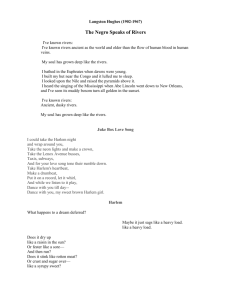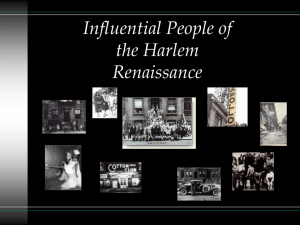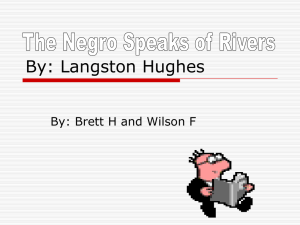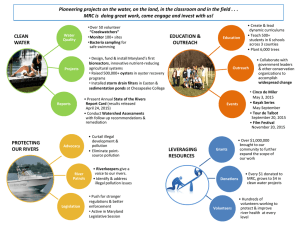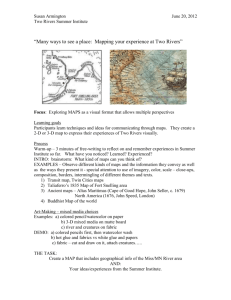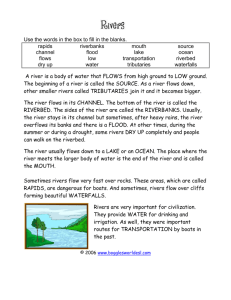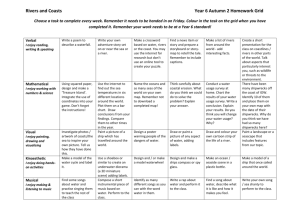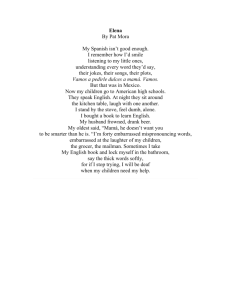Poems from text - Jones College Prep
advertisement
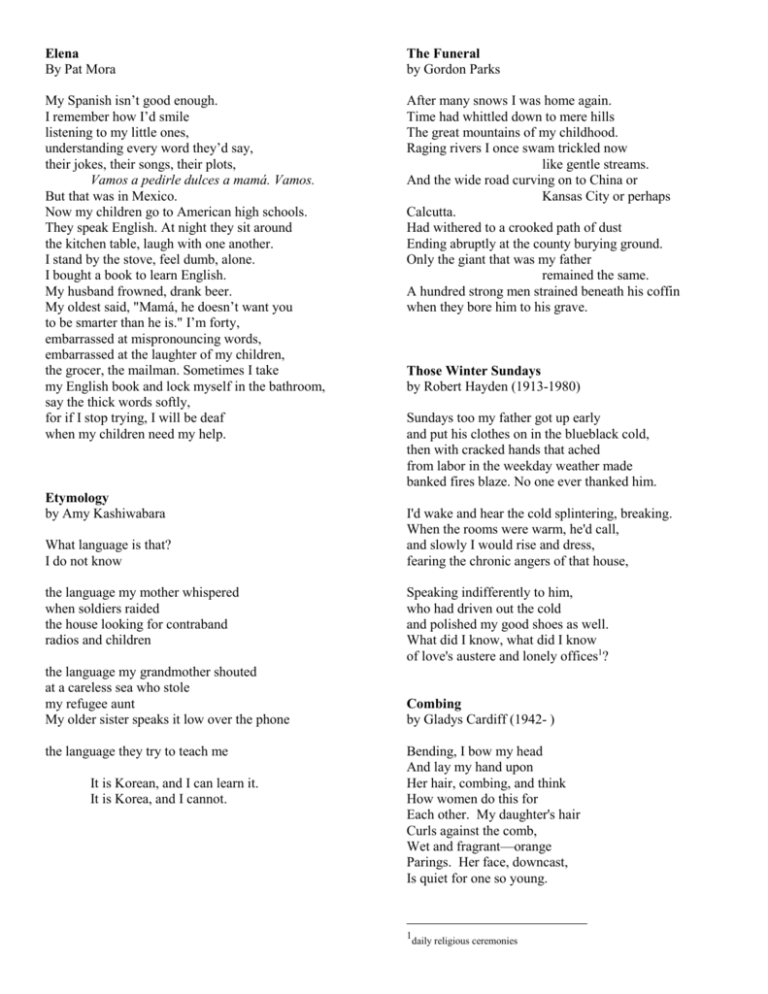
Elena By Pat Mora The Funeral by Gordon Parks My Spanish isn’t good enough. I remember how I’d smile listening to my little ones, understanding every word they’d say, their jokes, their songs, their plots, Vamos a pedirle dulces a mamá. Vamos. But that was in Mexico. Now my children go to American high schools. They speak English. At night they sit around the kitchen table, laugh with one another. I stand by the stove, feel dumb, alone. I bought a book to learn English. My husband frowned, drank beer. My oldest said, "Mamá, he doesn’t want you to be smarter than he is." I’m forty, embarrassed at mispronouncing words, embarrassed at the laughter of my children, the grocer, the mailman. Sometimes I take my English book and lock myself in the bathroom, say the thick words softly, for if I stop trying, I will be deaf when my children need my help. After many snows I was home again. Time had whittled down to mere hills The great mountains of my childhood. Raging rivers I once swam trickled now like gentle streams. And the wide road curving on to China or Kansas City or perhaps Calcutta. Had withered to a crooked path of dust Ending abruptly at the county burying ground. Only the giant that was my father remained the same. A hundred strong men strained beneath his coffin when they bore him to his grave. Etymology by Amy Kashiwabara What language is that? I do not know the language my mother whispered when soldiers raided the house looking for contraband radios and children the language my grandmother shouted at a careless sea who stole my refugee aunt My older sister speaks it low over the phone the language they try to teach me It is Korean, and I can learn it. It is Korea, and I cannot. Those Winter Sundays by Robert Hayden (1913-1980) Sundays too my father got up early and put his clothes on in the blueblack cold, then with cracked hands that ached from labor in the weekday weather made banked fires blaze. No one ever thanked him. I'd wake and hear the cold splintering, breaking. When the rooms were warm, he'd call, and slowly I would rise and dress, fearing the chronic angers of that house, Speaking indifferently to him, who had driven out the cold and polished my good shoes as well. What did I know, what did I know of love's austere and lonely offices1? Combing by Gladys Cardiff (1942- ) Bending, I bow my head And lay my hand upon Her hair, combing, and think How women do this for Each other. My daughter's hair Curls against the comb, Wet and fragrant—orange Parings. Her face, downcast, Is quiet for one so young. 1 daily religious ceremonies I take her place. Beneath My mother' hands I feel The braids drawn up tight As a piano wire and singing. Vinegar-rinsed. Sitting Before the oven I hear The orange coils tick The early hour before school. The Negro Speaks of Rivers by Langston Hughes (1902-1967) She combed her grandmother Mathilda's hair using A comb made out of bone. Mathilda rocked her oak wood Chair, her face downcast, Intent on tearing rags In strips to braid a cotton Rug from bits of orange and brown. A simple act, I bathed in the Euphrates when dawns were young. I built my hut near the Congo and it lulled me to sleep. I looked upon the Nile and raised the pyramids above it. I heard the singing of the Mississippi when Abe Lincoln went down to New Orleans, and I've seen its muddy bosom turn all golden in the sunset. Preparing hair. Something Women do for each other, Plaiting the generations. My soul has grown deep like the rivers. I've known rivers: I've known rivers ancient as the world and older than the flow of human blood in human veins. My soul has grown deep like the rivers. I've known rivers: Ancient, dusky rivers. The River Merchant's Wife: A Letter by Li-Po (702-762), trans. Ezra Pound (1885-1972) Barbie Doll by Marge Piercy (1936- ) This girlchild was born as usual and presented dolls that did pee-pee and miniature GE stoves and irons and wee lipsticks the color of cherry candy. Then in the magic of puberty, a classmate said: You have a great big nose and fat legs. She was healthy, tested intelligent possessed strong arms and back, abundant sexual drive and manual dexterity. She went to and fro apologizing. Everyone saw a fat nose on thick legs. She was advised to play coy, exhorted to come on hearty, exercise, diet, smile and wheedle. Her good nature wore out like a fan belt. So she cut off her nose and her legs and offered them up. In the casket displayed on satin she lay with the undertaker's cosmetics painted on, a turned-up putty nose, dressed in a pink and white nightie. Doesn't she look pretty? everyone said. Consummation at last. To every woman a happy ending. While my hair was still cut straight across my forehead I played about the front gate, pulling flowers. You came by on bamboo stilts, playing horse. You walked about my seat, playing with blue plums And we went on living in the village of Chokan Two small people without dislike or suspicion. At fourteen I married My Lord you. I never laughed, being bashful. Lowering my head, I looked at the wall. Called to, a thousand times, I never looked back. At fifteen I stopped scowling, I desired my dust to be mingled with yours Forever and forever and forever Why should I climb the lookout? At sixteen you departed, You went into far Ku-to-yen, by the river of swirling eddies, And you have been gone five months. The monkeys make sorrowful noise overhead. You dragged your feet when you went out By the gate now, the moss is grown, the different mosses. Too deep to clear them away! The leaves fall early this autumn, in wind The paired butterflies are already yellow with August Over the grass in the West garden; They hurt me. I grow older. If you are coming down through the narrows of the river Kiang Please let me know beforehand, And I will come out to meet you As far as Cho-fu-Sa. After the Dinner Party by Robert Penn Warren (1905-1989) You two sit at the table late, each, now and then, Twirling a near-empty wine glass to watch the last red Liquid climb up the crystalline spin to the last moment when Centrifugality fails: with nothing now said. What is left to say when the last logs sag and wink? The dark outside is streaked with the casual snowflake Of winter's demise, all guests long gone home, and you think Of others who never again can come to partake Of food, wine, laughter, and philosophy-Though tonight one guest has quoted a killing phrase we owe To a lost one whose grin, in eternal atrophy, Now in dark celebrates some last unworded jest none can know. Now a chair scrapes, sudden, on tiles, and one of you Moves soundless, as in hypnotic certainty, The length of table. Stands there a moment or two, Then sits, reaches out a hand, open and empty. How long it seems till a hand finds that hand there laid, While ash, still glowing, crumbles, and silence is such That the crumbling of ash is audible. Now naught's left unsaid Of the old heart-concerns, the last, tonight, which Had been of the absent children, whose bright gaze Over-arches the future's horizon, in the mist of your prayers. The last log is black, while ash beneath displays No last glow. You snuff candles. Soon the old stairs Theme for English B by Langston Hughes The instructor said, Go home and write a page tonight. And let that page come out of you--Then, it will be true. I wonder if it's that simple? I am twenty-two, colored, born in Winston-Salem. I went to school there, then Durham, then here to this college on the hill above Harlem. I am the only colored student in my class. The steps from the hill lead down into Harlem through a park, then I cross St. Nicholas, Eighth Avenue, Seventh, and I come to the Y, the Harlem Branch Y, where I take the elevator up to my room, sit down, and write this page: It's not easy to know what is true for you or me at twenty-two, my age. But I guess I'm what I feel and see and hear, Harlem, I hear you: hear you, hear me---we two---you, me, talk on this page. (I hear New York too.) Me---who? Well, I like to eat, sleep, drink, and be in love. I like to work, read, learn, and understand life. I like a pipe for a Christmas present, or records---Bessie, bop, or Bach. I guess being colored doesn't make me NOT like the same things other folks like who are other races. So will my page be colored that I write? Being me, it will not be white. But it will be a part of you, instructor. You are white--yet a part of me, as I am a part of you. That's American. Sometimes perhaps you don't want to be a part of me. Nor do I often want to be a part of you. But we are, that's true! As I learn from you, I guess you learn from me--although you're older---and white--and somewhat more free. This is my page for English B. 1951 Will creak with your grave and synchronized tread as each mounts To a briefness of light, then true weight of darkness, and then That heart-dimness in which neither joy nor sorrow counts. Even so, one hands gropes out for another, again.
